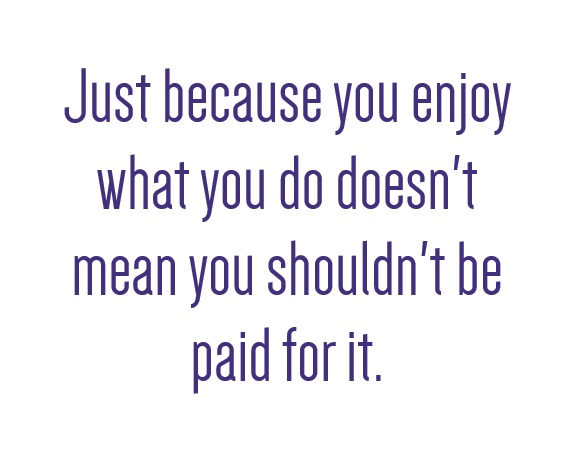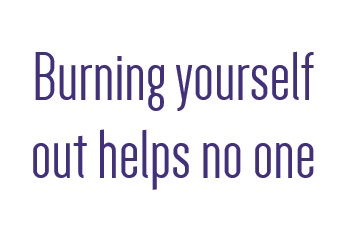Do you wear your busy-ness like a badge of honour?

Many years ago, in another life, I was an HR Administrator for a busy manufacturing firm in south Somerset.
The factory staff worked shifts but the office staff worked regular office hours. Rather than 9-5, we worked longer hours Monday to Thursday so we could close early on a Friday. Most working days were already longer than average, we started at 8 am and finished at 5.30 pm.
One senior manager was usually the first to arrive in the morning and the last to leave at night.
The trouble is, he expected his team to as well.

Basically, because he lived to work he expected others to do the same.
The business relocated to new premises; this manager was suddenly in an open planned office with the rest of us. When the clock hit 5:30 pm, everyone was out of the door, and on a Friday we were usually in the local pub by lunchtime.
As the daily mass exodus commenced, he’d sit there, narrow-eyed, scowling at everyone from his desk.
He’d never wish anyone a good evening, he’d just sit there, angrily tapping at his keyboard, muttering under his breath.
The Toxic Mutterer
His muttering got more and more vocal and one day (being a cocky, 20 something) I found the courage to stand up to him.
He made some sarcastic remark, “What is this, an early night?” at a couple of the admin team, who worked bloody hard at their jobs – a passive aggressive remark and I wasn’t having that bullying bullshit on my watch!
I responded, “Michael, we earn half the salary you do, so why should we work beyond our contracted hours? Don’t you have a home to go to? Your contracted hours are 5:30pm too you know. If you’re too busy to manage your workload in those hours, ask for help.”
(Names have been changed to protect the guilty)
Funnily enough, he never grumbled in front of me after that; in fact, he went out of his way to be nice to me!
The Scourge of Busy Sickness
I’m sharing this, as it’s a perfect example of the ‘guilt based busy sickness’ that infects the way we work in the UK.
The idea that, to be taken seriously, you must give your life to your employer. Your job IS your life.
Laying on the guilt…
How dare you take unreasonable liberties such as only working your contracted hours?
What’s wrong with you?
You’re so lazy?
Where’s your ambition?
I’m your boss, I pay you slightly more than minimum wage, therefore you should be grateful and sell your soul to me!
When you become your own boss…
So many of us become self-employed because we’re sick of working for unreasonable bosses in toxic work environments.
Perhaps you woke up to such tyranny one day and said, “enough is enough. I don’t need to take this anymore, I’ll find another way.”
Am I the only one sick of this Dickensian – wringing your flat cap in your hands worthlessly – ‘yes so, no sir, three bags full sir…’ – idea of what work should be?
After seven redundancy notices in five years (the seventh was my key to freedom!) I said to myself, “I’ll never work for anyone else again.” (I have done since, but only part time and temporary and only when it suited me!)
So, why do so many people become their own bosses and adopt the same approach to managing themselves?
Is it because being made to feel small and worthless, or bullied into submission by passive aggressive tutting and judgy-judgy eyeball rolling, has been our only experience of management?
Make time for life
I was on the receiving end of something similar to this at a networking event recently. Remarking that I avoid evening and weekend business events because that’s my time. Networking is part of my job so why should I do it in my own time?
I was laughed at.
With a snort, someone said “self-employed and you want a life?” as if that was a completely alien concept. Work IS your life. Busy is good (whether you’re paid or not). Aspiring to have a life beyond my job is a form of insanity. Somehow I’m not really a ‘serious businessperson’ because I want some semblance of work-life balance.
Measure of success
For me, having freedom, flexibility and more time to do things beyond working is a key measure of success for me and my business.
To work less and earn more when I do work are why I became self employed.
It has it’s challenges and ups and downs, of course, but at least that’s on my terms!
Think about that for a moment…
Now ask yourself: Are you being an unreasonable boss to yourself?
A reasonable boss will:
Set boundaries
Your boundaries are those written into your employment contract, such as contracted working hours. If an employer expects you to step beyond those agreed boundaries they should compensate you accordingly – i.e. time off in lieu or overtime – That’s only reasonable and fair.
As your own boss, you need to set your own boundaries. If you do step outside of those boundaries – i.e. spending time you should be spending with your family at an event – you need to compensate yourself for it. Either be making it pay for itself or by giving yourself the time off in lieu.
A fair day’s work for a fair day’s pay
In employment, if you go to work you expect to be paid.
We do a lot of things for free in our businesses, it’s part of the deal, but only give your time for free if it has real benefits to your business. I like to think of ‘free’ time as something I allocate from my marketing budget, set that ‘budget’ and stick to it!
Just because you enjoy what you do doesn’t mean you shouldn’t be paid for it.
Don’t be shy about asking to be paid for your time. And don’t forget to factor in all the ‘back office’ activities of your business into your pricing. If you were an employee, that business has to earn enough money to pay to employ people in the ‘non-money-making’ functions of the business, ie: marketing, product development, customer service, admin, managerial task, accounts, IT support etc.
When you are your business, you are also do all of those job roles, so you need to pay yourself for that time and energy you expend on them. Alternatively, you’ll need to make enough money to pay someone else to do them!
What are the costs financially, in time and energy of doing something, and what are the benefits?
Test them against each other – work out the pros and cons before you agree to work for free.
Down time
There are laws protecting the number of hours people can work and the amount of time off they are entitled to.
When you work for yourself, it’s up to you to plan your time, and that includes protecting time in your diary to take a break.
You may love what you do, you may feel invincible, but burning yourself out helps no one.
It doesn’t serve your customers, it doesn’t serve your friends and family, and it doesn’t serve you.
The law is there to protect people from exploitation by others. When you’re self-employed, make sure you don’t exploit yourself – because no one else will protect you!
Work smarter
In employment, you can often get away with wasting time or not working efficiently. You quickly learn what you can ‘get away with’ in a job. We need those moments to keep us sane when our time is owned by someone else.
When you own your time, you don’t get paid for being inefficient, wasting time or procrastinating. Analyse the things you busy yourself with in your day and decide what you could do more efficiently, what you can stop doing altogether, and what you can get someone else to do so you can focus on the activities that do pay you.
“Do what you do best and outsource the rest”
Work Smarter, not harder
Get Sh*t Done


